Study by RNC Pharma and Medvestnik
Around 32% of physicians in Russia consider exams to renew their medical license to be “average” in terms of difficulty, while another 23.2% call those exams “formal and requiring cramming, rather than knowledge” (Fig. 1), according to a survey conducted by the RNC Pharma analyst company and the Medvestnik platform for doctors. At the same time, 23.2% and 13% of the respondents say the level of difficulty is “high” and “very high”, respectively.
While most respondents thought that the difficulty level of license renewal exams was “average”, only about 2.2% considered them “easy.” In addition, a number of physicians provided their own answers, saying that the exam questions were often outside their specialty, as well as complaining about organizational issues, such as out-of-service equipment, lack of information on renewal requirements, etc.
Fig. 1. How would you rate the difficulty level of license renewal exam questions, including case problems? (single-answer question)
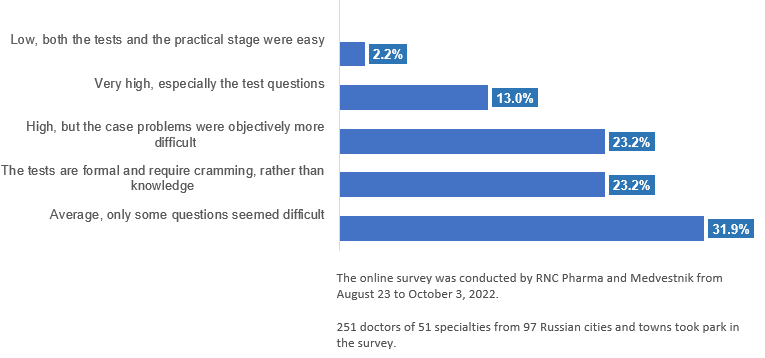
At the same time, most respondents, 71.7%, easily renewed their licenses, passing the exam at the first attempt (Fig. 2). It took 11.6% of the respondents two attempts. Finally, it took 6% of the physicians three or more attempts. Those who provided their own answer said that they had failed to pass the exam at the first attempt due to technical or organizational issues, such as lost documents, server errors, no response for a long time, etc.
Fig. 2. How many attempts did it take you to pass the exam? (single-answer question)
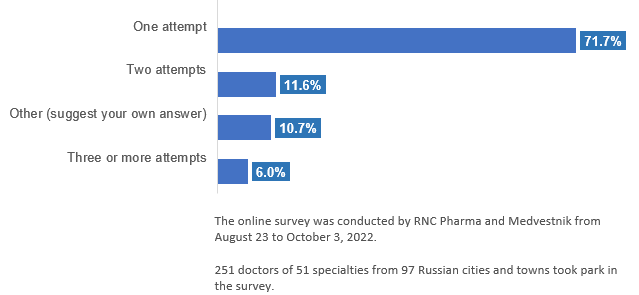
Another requirement for license renewal is a certain number of Continuing Medical Education (CME) points. The respondents were asked if they used the services of non-official assistants to accumulate points. Notably, most doctors (66.1%) do not resort to this opportunity (Fig. 3), although around 23.5% know this opportunity exists and that their colleagues have used it.
Around 21.6% of the respondents said that they used the services of intermediaries, while 12% of them did this to formally comply with the procedure. Since they study materials on areas of interest on their own, those physicians are apparently not satisfied with the quality of the CME content. Another 9.6% of the study participants have to turn to assistance because they are short on time.
Interestingly, there were a number of completely opposite opinions among those who chose to offer their own answer; for example, “I have not even heard of this”, or “If you continuously work as a doctor, it is not difficult to accumulate CME points.” Some even said that they had not used those services yet but would definitely resort to them later.
Fig. 3. Do you use the paid services of non-official assistants in order to accumulate CME points? (single-answer question)
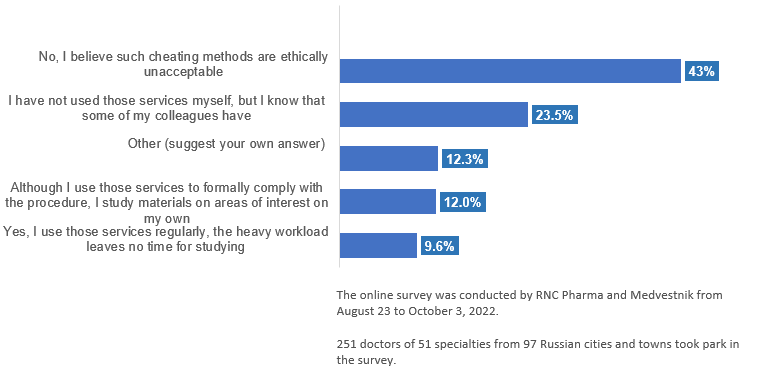
The opinions on the quality of advanced specialty training programs, a source for accumulating CME points, also divided. Around 27.5% of the physicians consider the quality of the existing courses to be “high” (Fig. 4). However, as many as 25.5% of the respondents say that they take those programs as “a simple formality, because the educational value is next to none.”
Nearly the same number of the respondents, 24.7%, thought the quality was “average”—while the data was properly organized, it was rather outdated. Another 8.4% of the doctors could not find programs that would satisfy their professional interests because the available data was “too general” in nature.
Finally, 4.8% of the respondents say that the programs are of poor quality and contain a large number of factual errors. Some of those who chose to give their own answer pointed that out as well, noting the fact that the programs do not correspond to “the new orders, resolutions, and sanitary regulations.” At the same time, some respondents say that the quality of the programs has significantly increased since 2015.
Fig. 4. How would you rate the convenience, quality and functionality of the advanced specialty training courses offered as a source of CME points on the edu.ru portal? (single-answer question)
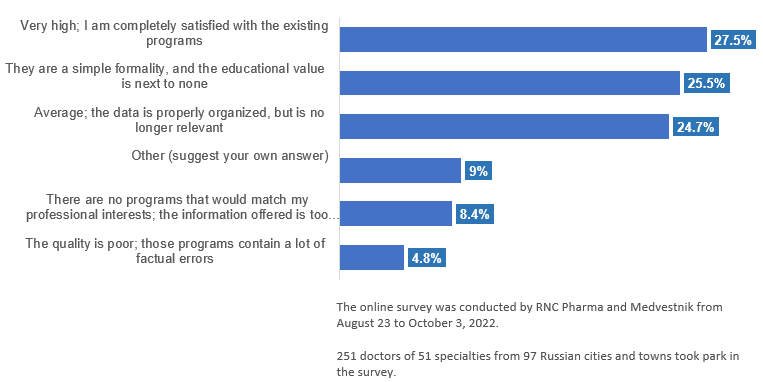
As for the preferred method of submitting documents for license renewal, 32.3% of the respondents chose the Federal Register of Health Professionals (Fig. 5). Another 29.1% of the doctors used the mail, and around 22% preferred to hand over their documents in person.
Those who gave their own answer noted the difficulties in submitting documents through the Federal Register, including the file size limit. This is one of the reasons why many prefer to hand over their documents in person or use postal or courier services.
Fig. 5. How do you submit documents for license renewal? (single-answer option)
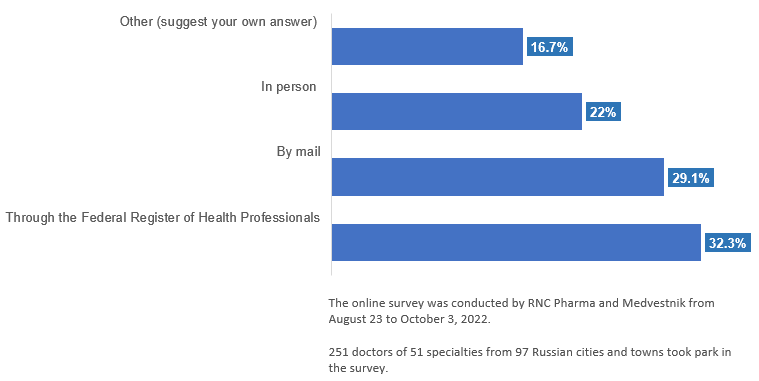
 Рус
Рус




